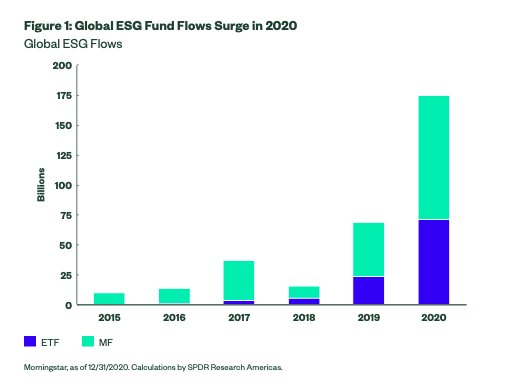By Brie Williams, Head of Practice Management, and Rebecca Chesworth, Equity ETF Strategist
So much transpired across society, economies and the investment community to advance ESG investing in 2020. Moving out of an exceptional third quarter, global inflows into ESG funds held strong, amassing $45.8 billion in Q4 2020, with Europe pushing past $821 billion in AUM to close the year.1 We believe ESG flows will continue to accelerate in 2021 as these four trends drive momentum:
1. An emphasis on ESG to pursue better risk-adjusted returns

The debate over whether positive ESG characteristics can afford a stock premium performance has dissipated over recent years. In fact, in 2020, ESG indices outperformed their non-ESG counterparts. Compared with the S&P 500 Index, the S&P 500 ESG and S&P ESG Exclusions II indices achieved ~1.5% outperformance, with less volatility of returns.2
These better risk-adjusted ESG returns were strongly correlated with quality and large-cap stocks in 2020. Although market dynamics are likely to be different in 2021, ESG strategies (whether exclusionary, best-in-class/positive screening and/or benchmark aware) could continue to benefit as they could remove potential threats to performance and help investors pursue lower downside risk. Given the evolution of views, we see investors becoming more willing to accept tracking error to standard benchmarks.3
2. The pandemic highlighting ESG’s lower-profile S pillar
Historically, the E in ESG has taken the spotlight, with vital emphasis on mitigating climate change through corporate and investor action. The climate story was not forgotten in 2020, and indeed many people reveled in the fact that lockdowns caused emissions to fall. However, the challenges that COVID-19 inflicted on workforces and underprivileged parts of the population made corporate social responsibilities more relevant, increasing the focus on the S in ESG and new means of measuring it.
Throughout the pandemic, we saw companies that were better prepared for upheaval prosper. During shareholder engagements by State Street Global Advisors, we saw how strategic planning on supply chains — including more diverse sourcing, digitalization and robust supply-chain risk management processes — helped companies in more strained times.
In the US, while President Biden has already rejoined the global effort to curb climate change, it is too early to gauge the administration’s impact on social issues. However, the inclusion demonstrated by Biden’s Cabinet picks sends a reinforcing message on the importance of diversity.
3. Increasing ESG integration into investment policy statements
Although ESG investing is not mandatory, global regulators and policymakers have published increasingly strict guidelines to ensure that asset managers who incorporate ESG considerations into their investment strategies can provide end investors with a transparent understanding of their methodology. For example, the United Nations-backed Principles for Responsible Investment (PRI) now requires its signatories to adopt mandatory climate-related financial disclosures, or face loss of their accreditation.
As Europe continued to advance toward ESG investment data standardization in 2020, the US made progress to regulate how companies disclose ESG information. To provide transparency for this information, a slew of reporting frameworks and scoring systems have been developed, although despite collaboration between the Sustainability Accounting Standards Board (SASB) and GRI (formerly named the Global Reporting Initiative), standard criteria on specific disclosures remains elusive in the US. And although the Securities and Exchange Commission has yet to take specific action to implement ESG requirements, expectations for transparency and comparability, as well as complete and accurate information, are rising.
Looking ahead, we believe that companies that engage in stakeholder capitalism (considering the impact on clients, employees, society) are likely to be better positioned for long-term value creation. This remains a core argument for value-based ESG integration.
To read the rest of this article, which first appeared on the State Street Global Advisors blog on Jan. 29, please go here.
Photo Credit: AirHaake via Flickr Creative Commons.
Footnotes
1) Morningstar, as of 12/31/2020. Calculations by SPDR Research Americas.
2) S&P Dow Jones Indices, December 31, 2020.
3) State Street Global Advisors, Global Market Outlook, “Investments Theme: Momentum Will Carry ESG Investing Far Beyond the Pandemic” Carlo Maximilian Funk https://www.ssga.com/etfs/insights/esg-investing-momentum-will-carry-it-beyond-the-pandemic
DISCLOSURE
The returns on a portfolio of securities which exclude companies that do not meet the portfolio’s specified ESG criteria may trail the returns on a portfolio of securities which include such companies. A portfolio’s ESG criteria may result in the portfolio investing in industry sectors or securities which underperform the market as a whole. Investing involves risk including the risk of loss of principal.
This publication may contain forward-looking assessments. These are based upon a number of assumptions concerning future conditions that ultimately may prove to be inaccurate. Such forward-looking assessments are subject to risks and uncertainties and may be affected by various factors that may cause actual results to differ materially.


